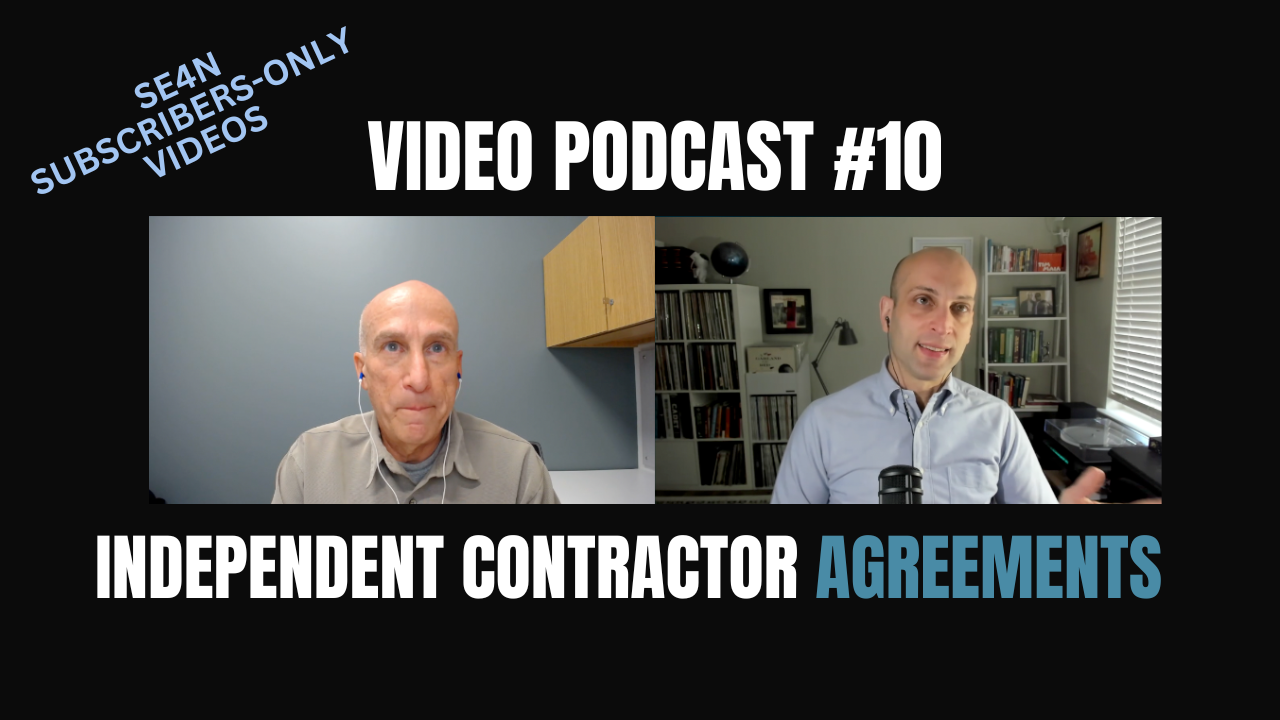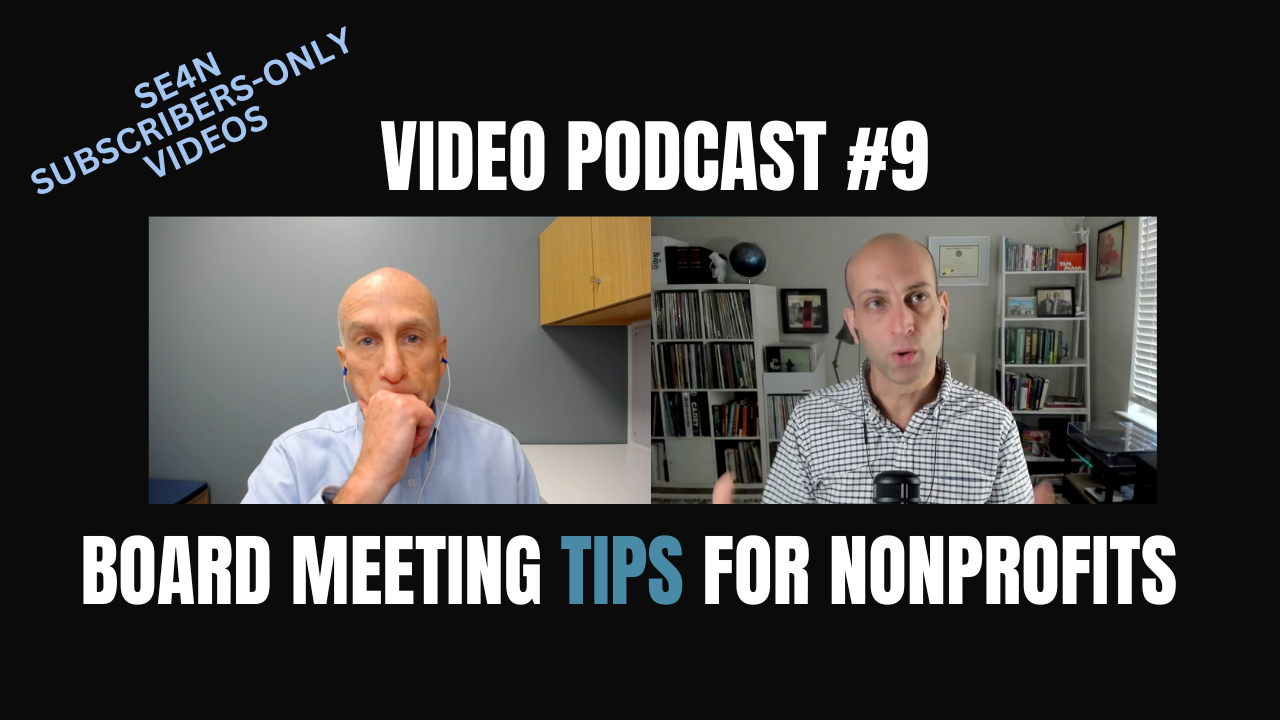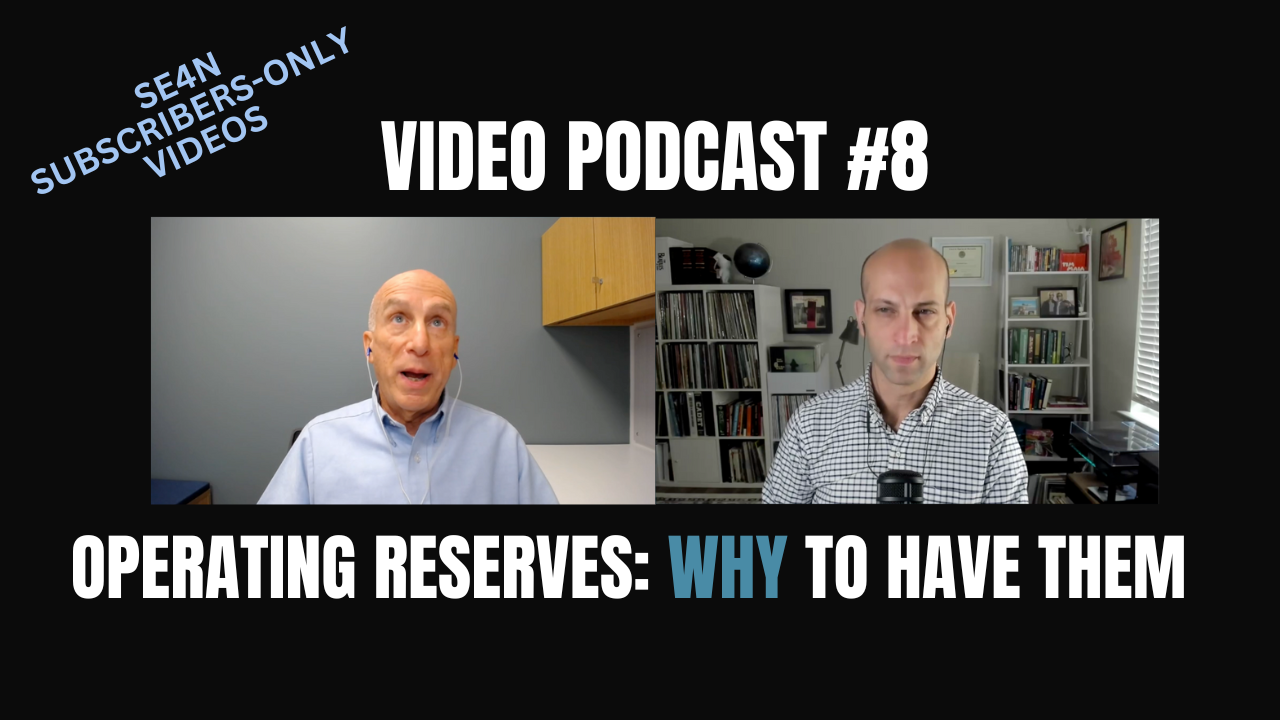
Blog.
Most Recent Posts

VIDEO Q&A for Subscribers: October 2024
Ben and Mike answer questions from subscribers about managing staff concerns about the additional workload that may come from forming a new subsidiary or related entity, mid-year amendments to the annual budget, whether an organization should restore its good standing as a corporation prior to dissolving, and the distinction between restricted funds and Board-designated funds.

TEMPLATE: Operating Reserves Status Report Spreadsheet
Operating reserves are one the most important components of financial health for a nonprofit organization and a key indicator for long-term fiscal and financial sustainability. Providing regular reports on the status of an organization’s operating reserves is essential for monitoring an organization’s financial health as well as compliance with its operating reserve policy.

The Problem with Hybrid Meetings and Events
In-person meetings and events are completely different animals from virtual meetings and events and that difference needs to be recognized and respected. In-person and virtual formats work best when they are exclusive and not combined into a “hybrid” format. While hybrid meeting and event formats may be used occasionally in response to unexpected disruptions, they should not be viewed as the new normal or a long-term option for the future.

VIDEO PODCAST: Drafting Independent Contractor Agreements
Ben and Mike discuss key issues nonprofits should consider when drafting independent contractor agreements for consultants and other service providers, including how independent contractor agreements impact worker classification, approaches to using and customizing template agreements, drafting compensation and scope of work terms, and more.

Q&A #167 – Does the Board of Directors have a responsibility to review staff policies?
The chief executive of a nonprofit organization usually has the primary responsibility for managing staff and human resources issues, including the development and implementation of most employee handbook policies. With some exceptions, nonprofit Boards are not expected to review and approve staff policies, but the Board’s oversight role includes a duty to take reasonable steps to confirm these policies are in place and updated periodically.
![VIDEO Q&A for Subscribers: September 2024 [SUBSCRIBERS-ONLY]](https://images.squarespace-cdn.com/content/v1/5e6ccadfb4659c1d51df14d5/f0598e46-14f4-464c-8b03-5ce99563762d/SE4N+Video+Q%26A+2024-09.png)
VIDEO Q&A for Subscribers: September 2024 [SUBSCRIBERS-ONLY]
Ben and Mike answer questions from subscribers about whether nonprofit organizations should require employees and Board members to provide receipts for small dollar expense reimbursements, tips for properly using executive sessions in Board of Directors meetings, and issues raised by nonprofits providing capacity building support to other nonprofits.

TEMPLATE: Code of Ethics
A Code of Ethics is one of the fundamental governance policies that all nonprofit organizations should have, and an important complement to your organization’s conflict of interest policy. This Code of Ethics template is intended to help your organization identify and express the core principles and ethical requirements with which all Board members, staff, and other individuals who serve and/or represent the organization are expected to comply.

How to Make Virtual Board and Committee Meetings More Effective
As the default format for Board and committee meetings has shifted to a virtual platform, nonprofit organizations must be careful to not let these regularly recurring governance meetings become stale and boring. It is time to freshen up these virtual governance meetings with a renewed focus on the smart use of time, attendee satisfaction, and maximizing impact and engagement.

VIDEO PODCAST: Board Meeting Tips for Nonprofits
Ben and Mike discuss tips and recommendations to help nonprofits make their Board meetings more efficient and impactful, including best practices related to advance notice and distribution of Board materials, creating a meeting agenda, use of a "consent agenda," and whether nonprofits should follow Robert's Rules of Order.

Q&A #166 – Are new nonprofits required to file BOI reports under the Corporate Transparency Act?
While the Corporate Transparency Act (“CTA”) exempts most tax-exempt organizations from the requirement to file beneficial ownership information (“BOI”) reports, there has been some confusion about whether these exemptions apply to new organizations that were just recently formed. A careful reading of the CTA statute and regulations strongly suggests that most newly formed nonprofit organizations are exempt from the BOI reporting requirements, even if their tax-exempt status has not yet been formally approved by the IRS.
![CHECKLIST: Virtual Board and Committee Meeting Tips [SUBSCRIBERS-ONLY]](https://images.squarespace-cdn.com/content/v1/5e6ccadfb4659c1d51df14d5/502237bc-b021-4573-8d4f-982a1b6e729c/benjamin-child-GWe0dlVD9e0-unsplash.jpg)
CHECKLIST: Virtual Board and Committee Meeting Tips [SUBSCRIBERS-ONLY]
The default format for traditional governance meetings (Boards of Directors, committees, working groups, etc.) has shifted to a virtual setting. However, most governance meetings still use agendas, approaches, and meeting structures based on old “in-person” meeting formats. This 4-page checklist is designed to help you freshen up your virtual Board and committee meetings, make them more effective, and improve participant engagement and satisfaction.
![VIDEO Q&A for Subscribers: August 2024 [SUBSCRIBERS-ONLY]](https://images.squarespace-cdn.com/content/v1/5e6ccadfb4659c1d51df14d5/94ba66db-acce-4fa3-8f98-f369cd6d48d0/SE4N+Video+Q%26A+2024-08.png)
VIDEO Q&A for Subscribers: August 2024 [SUBSCRIBERS-ONLY]
Ben and Mike answer questions from subscribers about whether fixed assets and restricted funds can count toward a nonprofit organization's operating reserves, the pros and cons of taking over an existing 501(c)(3) organization rather than starting a new one, how abstentions are counted in a Board vote, and whether an organization should use a credit card or debit card.

The Fundamentals of the Unrelated Business Income Tax (UBIT)
Business or “fee-for-service” revenue can be an important source of unrestricted funds for a well-rounded nonprofit organization. However, many organizations are hesitant to engage in commercial activities due to worries about the unrelated business income tax (“UBIT”). A basic understanding of UBIT fundamentals can alleviate these fears and help organizations to make better, more confident decisions about their business activities.

VIDEO PODCAST: Why Nonprofits Should Have Operating Reserves
Ben and Mike discuss the reasons why operating reserves are essential for the financial health and sustainability of nonprofit organizations, the short-term and long-term purposes of operating reserves, lessons learned from past economic disruptions, and some recommendations for operating reserve policies.

Q&A #165 – How often should a nonprofit CEO provide updates to the Board of Directors?
Providing monthly Board reports that include financial reporting and progress updates is an established best practice, and this is especially recommended during periods of change and for organizations whose Boards meet quarterly or less frequently. However, CEOs and Executive Directors must be thoughtful about the frequency and their method of communicating with the Board. Providing updates more often than monthly is usually only recommended in unusual situations.